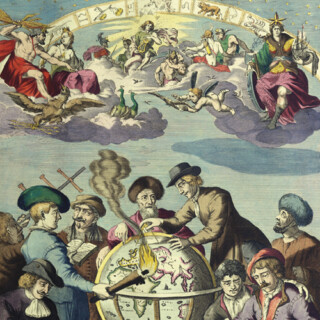Sed nulla potentia longa est Quo non discordia Cives
[?c1659].
Engraved map with view and 16 inset vignettes, trimmed to neatline and added margins.
313 by 376mm. (12.25 by 14.75 inches). Plate size: 295 by 352mm.
18344
notes:
Hollar's detailed print is not simply a map of the British Isles but also a political commentary comparing the English Civil War and the Bohemian Civil War of a few decades earlier.
The Thirty Years War, which lasted from 1618 to 1648, provided the training field for many English and Scottish soldiers who became members of Swedish mercenary forces, before later fighting in their own civil war at home. The English Civil War took place alongside the end of the long...
The Thirty Years War, which lasted from 1618 to 1648, provided the training field for many English and Scottish soldiers who became members of Swedish mercenary forces, before later fighting in their own civil war at home. The English Civil War took place alongside the end of the long...
bibliography:
NHG Hollar 1706; Pennington 543; BM 1868,0808.3229.
provenance:







![HOLLAR, [Wenceslaus] Sed nulla potentia longa est Quo non discordia Cives](https://i0.wp.com/crouchrarebooks.com/wp-content/uploads/2025/03/18344_1H.jpg?fit=3500%2C2833&ssl=1)
![HOLLAR, [Wenceslaus] Sed nulla potentia longa est Quo non discordia Cives](https://i0.wp.com/crouchrarebooks.com/wp-content/uploads/2025/03/18344_2H.jpg?fit=3500%2C2998&ssl=1)
